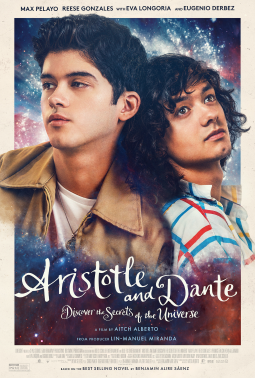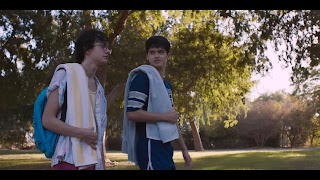ARISTOTLE AND DANTE DISCOVER THE SECRETS OF THE UNIVERSE
Ah, to be young, in love and in denial. Aristotle and Dante Discover the Secrets of the Universe makes as good a go as it can in adapting Benjamin Alire Saenz's young adult novel of Mexican teen boys discovering their same-sex love. It was a nice effort, but it was also sluggish and a bit muddled.
Angel Aristotle "Ari" Mendoza (Max Pelayo) is wandering through life in El Paso, Texas during the summer of 1987. Having nothing to do and nowhere to go, he struggles with his fear of swimming when he meets Dante Quintana (Reece Gonzalez). Dante, sole scion of a more intellectual couple, is proudly pocho (someone of Mexican descent who knows little to no Spanish). Aristotle, however, is more working-class and in touch with his heritage. Despite their disparate backgrounds, a friendship develops.
It may be more than a friendship, at least initially from Dante. A car accident causes Ari to sustain injuries saving Dante, who had gotten distracted by an injured bird on the road. Dante's family moves to Chicago for Mr. Quintana's job, with them maintaining their friendship via letters. The letters become more overt from Dante, who writes such things as asking Aristotle if he masturbates. Aristotle moves on, finding attraction with good-bad girl Elena (Luna Blaise), while Dante becomes more accepting of his homosexuality. It is to where, on a visit, Dante all but begs Ari to have a kiss. Reluctantly doing so, it becomes a triggering event, and a break in their relationship.
It may be due to the Mendoza family secret, eventually revealed: the older Mendoza brother Bernardo murdered a trans hooker. That crime haunts the family, and the growing yet conflicting feelings Aristotle has for Dante do not make it easier for him. Eventually, a gay bashing Dante endures along with another Mendoza family revelation brings Aristotle to accept that he is in love with Dante, with them at last finding the love that dare not speak its name.
Before I continue my Aristotle and Dante Discover the Secrets of the Universe review, I should for full disclosure reveal my connection to Benjamin Alire Saenz, whose young adult novel the film is based on. As a student at the University of Texas-El Paso, I took a writing class instructed by Professor Saenz. He was not fond of my work, telling me that it was "not Chicano enough". Separate from being a very curious criticism of my writing, I fail to see what my ethnicity has to do with the quality of my work. Still, I am not particularly fond of Mr. Saenz, but given the high praise Aristotle and Dante the book has received, I figured that my evaluation of the film should be based on what I saw.
What I saw was a curiously stiff production, one that went through the motions but never found a heart. Try as the film and the actors might, I never bought that Aristotle and Dante would be friends. There are many reasons for this. First, I think writer/director Aitch Alberto made a poor choice in having Aristotle be the voiceover. That essentially means that Aristotle and Dante is more Aristotle than Dante. In a book (and again, for full disclosure I have not read the book), you can have alternating voices. In a film, you can have either a character's perspective or an omnipresent perspective. I think maybe All About Eve or Rashomon are the handful of films that can have multiple perspectives, so it is possible to do have had Dante's side. Instead, by having it be more about Aristotle, Dante almost seems an intrusion to things. He does not exist on his own, but as something for Aristotle to enjoy and struggle with.
Another issue is the acting that hamper the film. We are supposed to believe that Aristotle and Dante have formed this deep, close and eventually intimate friendship. However, there is a curious stiffness between them, as if they are still trying to figure out who and what they are to each other. There was more chemistry between Aristotle and Elena than between Aristotle and Dante, even when they were merely platonic friends. As played by Gonzalez, Dante came across as needy and aggressive, not boyfriend material for either female or male. No matter how open Dante may have been, asking your supposed best friend if he would kiss you, if you have started masturbating and declaring that you want to marry a boy seems very curious for the late 1980s.
Peyalo was better as Aristotle, though he at times seemed to be sleepwalking through the film. This was something that affected most of the cast. The parents of Aristotle (Eugenio Derbez and Veronica Falcon) and Dante (Kevin Alejandro and Eva Longoria) did their best, but they too seemed to be rather stiff in their manner. Only Marlene Forte as Tia Ofelia had any spark to her character. Sadly, her character got short-changed when we discover at her death that she was a lesbian with a long-term partner. There was never any indication that Tia Ofelia was gay, so this revelation seems almost tacked on to show that the Mendoza family was almost riddled with homosexuality: lesbian aunt, transvestite* attracted brother, eventually gay son.The film starts off with perhaps one of the wildest and most unintentionally funny openings in recent memory. To be fair, the song choice to open our film of blossoming same-sex love is time appropriate. However, why open the film with Bronski Beat's Smalltown Boy? That song is open about a young man's homosexual awakening and the tragedy that it brought to him and his family. Somehow, it signaled that this was a same-sex love story versus letting us discover the secrets of their universe.
The film moves very stately for something that runs a little over ninety minutes. It, intentionally or not, seems to borrow from other LGBTQ films. There is the slow discovery of their love like Brokeback Mountain (I'm so tempted to call the film Brokeback Barrio). Derbez's speech to his son about there being nothing wrong with loving Dante in every way veers close to copying Call Me By Your Name, but without the screenplay's eloquence or the strong acting of that film.
Aristotle and Dante Discover the Secrets of the Universe, as a side note, has always struck me as a pompous title, but that's neither here nor there. It was a bit slow, a bit dull, a bit sputtering and a bit blank. Not a terrible film but a weak one. These secrets are not worth discovering.
* The film stumbles when Aristotle tells Dante that Bernardo killed a trans hooker "with his bare hands" (a phrase he repeats twice). Aristotle can't verbalize it, but I think he would have used "transvestite" versus "transgender" as I do not think that the latter term was in use at the time.



No comments:
Post a Comment
Views are always welcome, but I would ask that no vulgarity be used. Any posts that contain foul language or are bigoted in any way will not be posted.
Thank you.